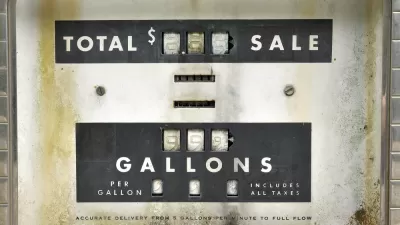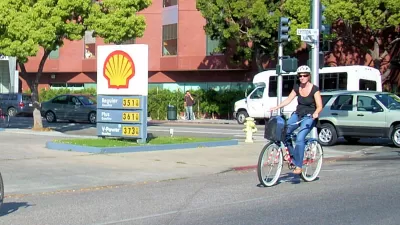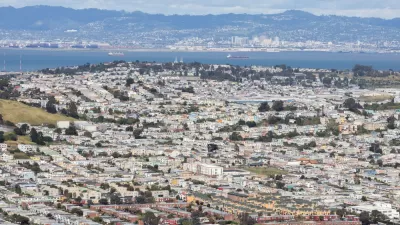It was not your basic fuel tax hike. Utah voters were told that raising the tax would help education by redirecting revenue from the General Fund to schools that currently goes to transportation. Yet voters also passed decidedly liberal initiatives.

As posted earlier, nearly 54 percent of Missouri voters rejected a 10-cents per gallon gas tax hike placed on the ballot by the legislature that would have funded roads and law enforcement. While Proposition D had its complications, the Utah measure likely proved even more troublesome for voters.
"Utah voters rejected a nonbinding opinion question that asked whether the Utah Legislature should to raise the gasoline tax by 10 cents a gallon to provide more funding for education and local roads on [Nov. 6]," reports Marjorie Cortez for Deseret News. Almost 66 percent of voters voted "No" to the advisory question that was placed on the ballot by the legislature.
Austin Cox, campaign manager for Question 1, said the ballot question was confusing for voters because it was nonbinding, that revenues would be shared with local roads, and historically, fuel tax has not funded education.
As posted in September, the Beehive State, like most states, places constitutional restrictions on the spending of gas tax revenue, generically referred to as transportation lockboxes. "In fact [pdf], Alaska is the only state to not have statutory or constitutional restrictions on transportation revenue diversion," according to the Eno Center for Transportation.
Had voters approved Question 1, the gas tax revenue would have gone to roads, but it "would offset general fund earmarks that, in past years, have gone to transportation projects and ostensibly make more General Fund revenue available for education," explains Cortez. The offsetting mechanism illustrates the extent to which state governments subsidize roads, i.e., proving that roads are not entirely funded by dedicated user fees but are dependent on general tax revenue.
Supporters...campaigned on the premise that the average driver would pay just $4 a month more in fuel tax, which would generate more than $100 million annually for public education, the equivalent of $150 per student. Higher education would receive $25 million annually while local road funding would increase $55 million per year.
Campaign finance and path to the ballot
Supporters, primarily Our Schools Now, the group backing the measure, raised almost $1.3 million. Opponents, including Americans for Prosperity – Utah, did not list any contributions.
Our Schools Now was going to place an initiative to hike income and sales taxes to fund education on the ballot, but they stuck a deal with the legislature which resulted in Question 1.
"This has been a very complicated message from Day 1. As soon as we made a compromise with the Legislature, we immediately saw support (for the former citizen's initiative Our Schools Now) decrease and we knew it was going to be a challenge," said Cox.
Voters approve progressive initiatives
When it came to other ballot measures, Utahans showed a surprisingly progressive orientation:
- Approving the legalization of medical marijuana initiative by almost 53 percent,
- The expansion of Medicaid initiative under the Affordable Care Act by nearly 54 percent,
- The Independent Redistricting Commission Initiative appears to be narrowly losing, though it's too close to call.
Still, that's a far cry from rejecting a school fund measure, albeit one that hikes gas taxes, by almost 66 percent. Why the disconnect?
Related in media:
- Governing: "Transportation Funding Changes Fail at the Ballot Box" – Voters in Colorado, Missouri and Utah rejected new money sources for roads, while Californians opted to keep a recent gas tax hike, Nov. 7.
- Salt Lake Tribune: "Obstacles that we couldn’t overcome’: Ballot question to boost gas tax for Utah schools falls short," Nov. 7.
-
Missouri legislators approved a bill at the end of the legislative session to place a 10-cents per gallon gas tax increase on the ballot to fund road repair. It had the support of Gov. Mike Parson but was rejected by nearly 54 percent of voters.
-
Voters in Four States to Decide on Transportation Sales and Fuel Taxes, September 28, 2018Californians will determine whether to repeal recent fuel tax and user fee increases; Missourians to vote on a 10-cent gas tax hike over 4 years; Coloradans whether to hike the sales tax, and the most interesting measure will be decided in Utah.
FULL STORY: Utah voters reject nonbinding question for gas tax hike to help fund education

Maui's Vacation Rental Debate Turns Ugly
Verbal attacks, misinformation campaigns and fistfights plague a high-stakes debate to convert thousands of vacation rentals into long-term housing.

Planetizen Federal Action Tracker
A weekly monitor of how Trump’s orders and actions are impacting planners and planning in America.

In Urban Planning, AI Prompting Could be the New Design Thinking
Creativity has long been key to great urban design. What if we see AI as our new creative partner?

King County Supportive Housing Program Offers Hope for Unhoused Residents
The county is taking a ‘Housing First’ approach that prioritizes getting people into housing, then offering wraparound supportive services.

Researchers Use AI to Get Clearer Picture of US Housing
Analysts are using artificial intelligence to supercharge their research by allowing them to comb through data faster. Though these AI tools can be error prone, they save time and housing researchers are optimistic about the future.

Making Shared Micromobility More Inclusive
Cities and shared mobility system operators can do more to include people with disabilities in planning and operations, per a new report.
Urban Design for Planners 1: Software Tools
This six-course series explores essential urban design concepts using open source software and equips planners with the tools they need to participate fully in the urban design process.
Planning for Universal Design
Learn the tools for implementing Universal Design in planning regulations.
planning NEXT
Appalachian Highlands Housing Partners
Mpact (founded as Rail~Volution)
City of Camden Redevelopment Agency
City of Astoria
City of Portland
City of Laramie





























